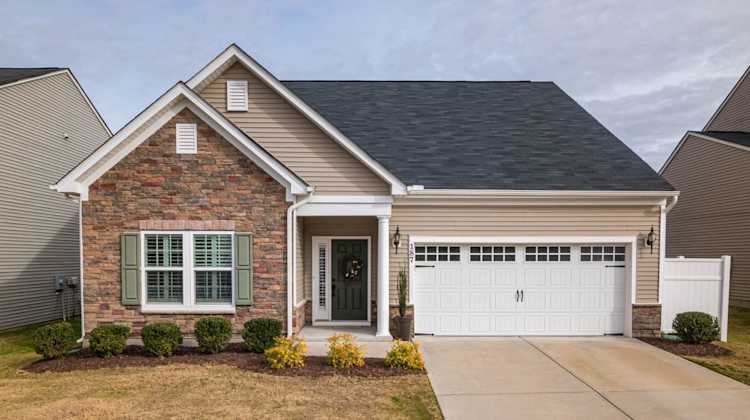Renting vs. Buying: What Can You Afford?
by PCSgrades Staff - September 22nd, 2021

It’s often said that buying a home is the largest purchase most people will ever make. For military families, who typically move every couple of years, the thought of making such a huge purchase and having to leave only a few years into home-ownership can be intimidating. There is a lot to consider. If you live off base, the service member will receive BAH to help cover the cost of local housing. Whether you apply that BAH to renting or to a mortgage is up to you. This article will help you see the upfront costs and the recurring costs or either renting a place or buying a home.
There is no “right” or “wrong” answer to the Buy v. Rent question. One military family may choose to rent since they’re not sure when orders will come. Another mil family might choose to purchase if they are in the right place financially. A buyer’s market in the local area might confirm the decision. A veteran family nearing their “final” retirement may choose to downsize and become renters again. The following is a great start as you deliberate whether buying or renting is for you and check out PCSgrades.com to find your A-Graded Real Estate Agent.
Upfront costs of renting
Security Deposit – A security deposit of one or two month’s rent is usually required by a landlord. This is to ensure against property damage, a broken lease, or late rent payments.
First Month’s Rent – Many landlords require the first month’s rent upfront.
Nonrefundable Deposits – These deposits, often referred to as pet deposits, typically range from$100 to $500.
Reoccurring costs of renting
Monthly Rent – This is the payment due to your landlord or Property Management Company each month.
Renters Insurance – While renters insurance is not required, it is highly recommended to protect against loss due to fire or theft. The cost is based on the value and quantity of your household goods, other valuables, and your deductible among other factors. The folks at Armed Forces Insurance can help you to determine how much coverage you need.
Utilities – Utilities may be included in the monthly rent. Otherwise, the renter is responsible for payment which varies depending on personal use.
Laundry – Many rentals don’t have in-unit laundry machines, so money needs to be set aside on a weekly or monthly basis.
Pet Rent – In addition to a pet deposit, some landlords will charge monthly rent for your pet.
Upfront costs of owning your home
Earnest Money – In some areas where potential buyers compete to own property, it might make sense to offer earnest money. This is typically 1% to 3% of the home’s purchase price. After accepting the offer, the seller deposits this money into an escrow account to be credited against closing costs.
Down Payment – Your down payment amount will vary depending on your credit rating, the local market, and the type of mortgage loan you’re approved for. If you are using a VA Home Loan, you may be able to forgo a down payment.
Home Inspection – An inspection by a licensed home inspector is almost always a condition of loan approval. Home Inspectors look for potential problems and defects that might not be apparent to an inexperienced buyer. The cost is typically $300 to $500.
Home Appraisal – Lenders require an appraisal before approving the loan to ensure that the offer price matches the actual value of the home. Appraisal costs typically run $300 to $500.
Property Taxes – Property taxes are usually paid up front, many times in six-month increments. Buyers will need to pay the seller for taxes already paid for the period between the closing date and the end of the current tax period.
Closing Costs �– This expense varies widely, usually ranging from 2% to 4% of the purchase price. It can include a certification fee, lender’s and owner’s title insurance, state and local transfer taxes, recording taxes, first month’s mortgage interest, and closing fee. You can ask your real estate agent about approaching the seller to share some or all of your closing costs.
Reoccurring costs of owning your home
There are several recurring costs that come with home-ownership. Some of these costs may be included in the escrow payment made to your lender each month. Other expenses are paid separately. Loan Payments – Principal and interest payments are paid each month for the life of your mortgage loan, which is usually for a 15 or 30 year period. The loan payment for a fixed-rate mortgage remains constant for the full term of repayment. For an adjustable-rate mortgage, the rate is tied to a benchmark. The payment varies as the benchmark changes. The loan payment is included in your monthly escrow payment.
Property Taxes – Your local city or county sets the property taxes which help pay for schools, infrastructure, and other critical services such as fire departments. The rates vary widely depending on where you live and sometimes change from year to year. One-twelfth of your annual tax burden is due each month as part of your monthly escrow payment. Some states and counties forgive property taxes for veterans with a 100% disability rating.
Utilities – Homeowners are generally responsible for paying all utilities and local services on the property. Included are: gas, water, electric, garbage, recycling, cable and internet. These costs will vary widely by location and usage.
Maintenance – Homeowners are also responsible for all home maintenance and upkeep costs, such as replacing appliances, outside shutters, exterior painting, and HVAC cleaning and inspection. Generally you can expect to pay 1% of your home’s value per year on maintenance, replacements and repairs.
Insurance
Homeowners Insurance – The average annual 2020 U.S. homeowners’ insurance premium was $1,242 on a $300,000 dwelling with $1,000 deductible and $300,000 in liability coverage. These premiums can vary from year to year and state to state based on changes in your home’s appraised value, the policy’s deductible, coverage amounts, claim history, and your personal credit score. Just like property taxes, you pay one-twelfth of your annual homeowners premium with your monthly escrow payment.
Private Mortgage Insurance – If your down payment is less than 20% of the purchase price of your home and your mortgage lender is a private company, your monthly escrow payment will initially include private mortgage insurance (PMI). PMI protects your mortgage lender from financial loss if your home ends up in foreclosure. It is sold at a price lower than your purchase price. Lenders generally honor a borrowers’ PMI cancellation request once the loan-to-value (LTV) ratio – the ratio of your current mortgage balance to your home’s total value – reaches 80%. If you do not have a good credit rating, your lender may require you to carry PMI until your LTV is lower. Monthly PMI payments typically range from $50 to $200, depending on the loan’s balance and PMI rate. One benefit to using the VA Loan is that you do not have to pay PMI.
Special or one-time costs
Improvements and Renovation Projects – Costs for renovations and improvements are generally paid out-of-pocket. Some homeowners choose to take out a home improvement loan. These improvements can be anything from replacing siding to doing a full kitchen renovation. Any PCSgrades graded Real Estate Agent can tell you whether a specific home improvement is likely to boost your home’s appraised value.
Buy vs rent
Whichever you choose, there may be some pros and cons. There is a lot of flexibility that comes with renting– your contract is only for one year and is easy to get out of if you receive PCS orders, have a baby, or just want to change your lifestyle. But there are also some great rewards which come with home ownership. As a homeowner, you’ll receive tax breaks every year, and you have the potential to make additional income off your property if you rent it out or sell it for a profit. The decision of whether to rent or buy is very personal. It is one that will be based on your current finances, the status of your career, and what fits best for your current lifestyle. PCSgrades is here to help you navigate the decision with review written by military families, FOR military families.









